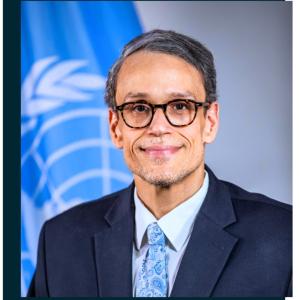Permanent Secretary, Ministry of Gender, Children and Social Welfare
Executive Director,National Agency Against Trafficking in Persons -NAATIP
UN heads of agencies and UN colleagues present
All partners including CSOs, diplomatic partners, members of the media
All the children and youth present
All protocols observed,
Distinguished guests,
It is a pleasure to be with you today to commemorate the World Day Against Trafficking in Persons, a UN designated day aimed at raising awareness on human trafficking and promoting efforts to combat it.
It is a reminder of the severity of this crime and the need for global solidarity in addressing its root causes, protecting the rights of victims, and prosecuting perpetrators.
This year’s theme is , “Leaving No Child Behind in the Fight Against Human Trafficking.”
Globally, children make up almost a third of all human trafficking victims and twice as likely to face violence during trafficking than adults.
No country is therefore immune to child trafficking, including The Gambia.
Adolescent girls are at heightened risk of becoming victims of violence as well as sexual exploitation.
Furthermore, children with disabilities are also vulnerable due to pervasive stigma and stereotypes as well as their limited access to services.
Distinguished guests,
The UN in The Gambia through its Cooperation Framework seeks to support vulnerable groups such as victims of trafficking, including children.
With our partners, we
- strengthen law enforcement and justice systems to effectively combat trafficking;
- provide crucial legislative support to reinforce anti-trafficking laws;
- enhance child protection systems to deliver inclusive, high-quality services for victims including unaccompanied and separated children, displaced children, and child victims of trafficking;
- offer targeted support to child victims, including adolescents, through skills development and reintegration programs.
In addition to the above we have learnt key lessons in trying to combat trafficking.
The first is ensuring meaningful participation of children and adolescents in discussions and the development of policies and laws that affect them.
Meaningful participation will prepare children and young people advocate against trafficking, raise awareness of emerging vulnerabilities such as climate change and food insecurity, come up with creative solutions and as rights holders demand concrete action, and accountability.
The second lesson is that education is a powerful tool in the prevention of trafficking.
Inclusive access to quality education and life skills will equip our children, especially girls, to protect themselves against traffickers and provide them with better opportunities for economic independence in the future.
Ladies and gentlemen, dear students,
As we commemorate World Day Against Trafficking in Persons, let us renew our commitment toprotecting every child's fundamental human rights as obligated under international human rights instruments such as the Universal Declaration for Human Rights and the Convention on the Rights of the Child.
As the UN, we remain committed to supporting The Gambia including national authorities, civil society and communities to ensure the protection and wellbeing of victims of trafficking including children.
Thank you once again for your dedication and engagement and I declare this commemoration open.
END.









